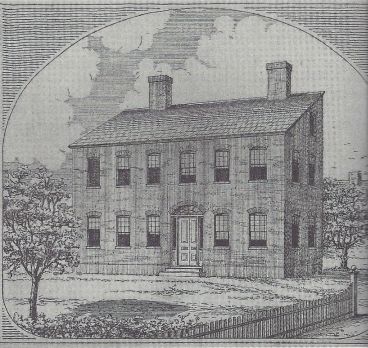Author: Sara Salinas, Boston Globe Correspondent
“While city officials look to bring new life to City Hall Plaza, a group of local historians is calling for a memorial to the life once lived under the bricks.
Historians have mapped the approximate location of the former home of Joseph Warren, a physician and general during the American Revolution, to the land under City Hall. The home on Hanover Street was demolished prior to 1840 and the location largely forgotten.
Generations later, a group led in part by Harvard University professor Sam Forman is proposing a privately funded memorial commemorating the location, a spot Forman considers critical to the start of the American Revolution.
“The immediate activities that sent Paul Revere and William Dawes on the iconic midnight ride transpired in Dr. Joseph Warren’s home office,’’ said Forman, a Warren biographer. “These are iconic events triggering the American Revolution.’’
A proposal for a flush-to-the-ground memorial — similar to the one marking the site of the Boston Massacre — is under consideration as part of ongoing efforts to revitalize the area surrounding City Hall, according to Tricia Lyons, director of public facilities for the city.
Plans for a memorial or any other design feature won’t be final until at least the end of the year, she said.
The master planning project is not yet at the stage of considering funding for proposals, she said, but Forman said that the memorial is likely to cost hundreds of thousands of dollars and would be privately funded.
The expansive brick-and-concrete plaza often draws criticism for appearing unwelcoming, even as the city has tried to rebrand the plaza as a place for civic engagement and community gathering. The plaza often hosts concerts, food festivals, and cultural celebrations.
“A part of this rethinking of the City Hall Plaza should be to reengage its historical legacy and in so doing link its history to the city of Boston as a place not only of partying but also of civic engagement and of city, state, and national significance,’’ Forman said.
Forman said the legacy of Warren’s home was lost around 1940, when plans for the construction of the new federal building adjacent to City Hall Plaza first began. Before that, the American House hotel stood on what is now the northeast corner of City Hall Plaza, displaying a bronze plaque marking the site of the former general’s home.
The new memorial would claim the site as the “Starting Point to the American Revolution,’’ Forman said.
On April 18, 1775, Warren called Revere to his home office and informed him of the impending arrival of British soldiers, according to Revere’s own account of the events. Warren then sent Revere on his historic midnight ride to Lexington to warn John Hancock and Samuel Adams, the ride that Forman believes kickstarted the American Revolution.
Revere made a few stops between leaving Warren’s home and mounting a horse, according to the account. He visited a friend, went home, got his boots, rode a boat across the river to Charlestown, and only then met a horse for the historic ride — about an hour after leaving Warren.
The steps in between don’t bother Forman, he said — the directive from Warren to ride to Lexington was given on the site under City Hall Plaza — but they cause at least one historian to question the location as the Revolution’s so-called “starting point.’’
“That’s really not right. That’s really a stretch,’’ said Pat Leehey, research director at the Paul Revere House. “It’s a little bit more complicated than that.’’
Leehey agreed that a memorial to Warren — a man he said some believe could have been the country’s first president had he not died in the Battle of Bunker Hill — is a good idea, and the site of his former home is a logical place.
But misleading language about Revere on a proposed memorial could confuse tourists about the order of events, Leehey cautioned.
“It would be a real problem [for the Paul Revere House],’’ he said. “We have to perpetually unexplain things.’’
The precise language and appearance of the proposed memorial are yet to be determined, Forman said. The group believes it would be premature to finalize the plans before city officials commit.”
Source: Boston Globe, Sunday, September 3, 2017, Metro section pages B1, B3. Reporter Ms. Sara Salinas can be reached at sara.salinas@globe.com. Follow her on Twitter at @saracsalinas.
Commentary: A group of citizens seeks to memorialize the former site of Joseph Warren’s house, now beneath City Hall Plaza. Here, on the evening of April 18, 1775, Dr. Joseph Warren, acting under authority of the Massachusetts Provincial Congress, ordered the mobilization of the Massachusetts militia and minutemen in response to British troop movements. He dispatched Paul Revere and William Dawes on the iconic Midnight Ride to disseminate his decision. Warren’s actions in that house constitute a proximate act initiating the Revolutionary War.
Mayor Walsh has called for re-energizing the plaza and has taken several concrete and popular steps in that direction. Memorializing the spot of Warren’s House would greatly enhance these efforts by uniting the Brutalist, ultramodern style of City Hall Plaza with its historic roots as a place of civic engagement – a site of Boston, Massachusetts, and national significance.
One minor point of clarification. I am stated in the article to be a Harvard professor rather than my adjunct appointment as visiting scientist. Thank you, Boston Globe, for the promotion.

 Follow
Follow